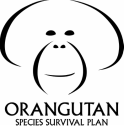ORANGUTAN SSP GRANT FUNDING
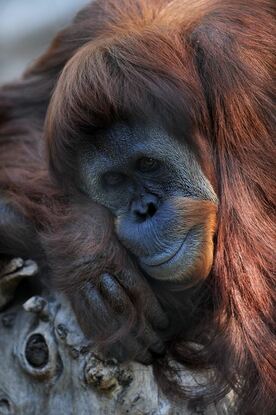 Photo Credit - Steve Okamura
Photo Credit - Steve Okamura
The Orangutan Species Survival Plan (SSP®) actively supports initiatives that advance its mission of overseeing the management of orangutans within AZA member institutions and enhancing the conservation of orangutans in the wild. On an annual cycle, the SSP® considers proposals not exceeding $5,000 to fund projects that specifically meet these criteria.
PROPOSALS THAT ADDRESS THE FOLLOWING WILL BE CONSIDERED FOR FUNDING:
Basic science:
Studies that occur ex situ may cover a range of academic disciplines and focus on a variety of topics. Emphasis is placed on projects that have an applied value in terms of increasing the general knowledge of the genus Pongo. Examples include veterinary and nutritional care, husbandry, and captive management. Research must not compromise the welfare of individual subjects, or their social partners. Studies that collect data through opportunistic sampling are highly preferred. Elective sedation solely for the purpose of research will not be considered.
Conservation-useful science (as described in: Defining Field Conservation for the AZA Community):
PROPOSALS THAT ADDRESS THE FOLLOWING WILL BE CONSIDERED FOR FUNDING:
Basic science:
Studies that occur ex situ may cover a range of academic disciplines and focus on a variety of topics. Emphasis is placed on projects that have an applied value in terms of increasing the general knowledge of the genus Pongo. Examples include veterinary and nutritional care, husbandry, and captive management. Research must not compromise the welfare of individual subjects, or their social partners. Studies that collect data through opportunistic sampling are highly preferred. Elective sedation solely for the purpose of research will not be considered.
Conservation-useful science (as described in: Defining Field Conservation for the AZA Community):
- Field conservation conducted in situ that involves "Direct Action" such as field work, species recovery, veterinary care, and costs associated with maintaining assurance populations.
- Research in or ex situ that advances the conservation of wild orangutans or their habitat.
- Field Conservation Education such as awareness-building through the production of educational materials, outcome-oriented education, and training/capacity building.
 Photo Credit - DC Zoo Walks
Photo Credit - DC Zoo Walks
Sanctuaries and Rehabilitation Centers:
Requests for operating and capital expenses for in situ sanctuaries and rehabilitation centers that care for orangutans will be considered.
Emergency Appeals:
Unanticipated emergencies directly related to the mission of the SSP® may be eligible for funding. In these cases, the steering committee may vote to respond proactively without receiving a proposal.
Applicants should keep in mind that projects that allow the SSP® to be distinctively identified, as opposed to being part of a large commingled funding pool, are encouraged. The funded activity may be part of a larger collaborative effort, but the SSP's® mission is often best advanced by clear identification with a discrete aspect of the work. The SSP® does not typically provide seed money to start a project whose completion will depend on subsequent support.
The SSP® is philosophically committed to the idea that local people are an essential part of the conservation equation; therefore, sustainable co-existence between humans and wildlife is of paramount concern. Preference will be given to in situ investigators who invest in local people and encourage sustainability. This may include training, employment, mentorship, or academic opportunities.
SUBMISSION PROCESS (Application Form)
All proposals must contain a cover letter, CV for the principal investigator, and a completed proposal funding form (attached). Incomplete submissions will not be considered. If applicable, verification of IACUC or IRB approval by the applicant's home institution, letters of approval from the research site (in or ex situ), and documentation of domestic and/or international permits should be included.
It is expected that student proposals are jointly submitted with the student's primary advisor. A letter of endorsement from the primary advisor should be included.
Deadline for annual proposal submissions is August 31. Funding decisions are finalized and notifications will be made by
November 30. Any proposals received after August 31 will be considered for the following calendar year.
All proposals should be submitted electronically to Research Advisor Dr. Meredith Bastian. Applicants should expect an acknowledgment when their proposal is received.
EVALUATION
Grantees are expected to provide an annual progress report. Due dates for reports will be coordinated based on the schedule for each project. When appropriate, a peer-reviewed publication can serve as the annual report. In other cases, a narrative is the best option. This should include a detailed assessment of accomplishments, and measures of conservation success when appropriate. Inclusion of photos, educational materials, copies of media coverage and other products are highly encouraged.
A complete accounting of expenditures including receipts or other proof of payments must be provided annually or upon request.
New proposals from the grantee will not be considered until annual reports have been received for previously funded projects.
Requests for operating and capital expenses for in situ sanctuaries and rehabilitation centers that care for orangutans will be considered.
Emergency Appeals:
Unanticipated emergencies directly related to the mission of the SSP® may be eligible for funding. In these cases, the steering committee may vote to respond proactively without receiving a proposal.
Applicants should keep in mind that projects that allow the SSP® to be distinctively identified, as opposed to being part of a large commingled funding pool, are encouraged. The funded activity may be part of a larger collaborative effort, but the SSP's® mission is often best advanced by clear identification with a discrete aspect of the work. The SSP® does not typically provide seed money to start a project whose completion will depend on subsequent support.
The SSP® is philosophically committed to the idea that local people are an essential part of the conservation equation; therefore, sustainable co-existence between humans and wildlife is of paramount concern. Preference will be given to in situ investigators who invest in local people and encourage sustainability. This may include training, employment, mentorship, or academic opportunities.
SUBMISSION PROCESS (Application Form)
All proposals must contain a cover letter, CV for the principal investigator, and a completed proposal funding form (attached). Incomplete submissions will not be considered. If applicable, verification of IACUC or IRB approval by the applicant's home institution, letters of approval from the research site (in or ex situ), and documentation of domestic and/or international permits should be included.
It is expected that student proposals are jointly submitted with the student's primary advisor. A letter of endorsement from the primary advisor should be included.
Deadline for annual proposal submissions is August 31. Funding decisions are finalized and notifications will be made by
November 30. Any proposals received after August 31 will be considered for the following calendar year.
All proposals should be submitted electronically to Research Advisor Dr. Meredith Bastian. Applicants should expect an acknowledgment when their proposal is received.
EVALUATION
Grantees are expected to provide an annual progress report. Due dates for reports will be coordinated based on the schedule for each project. When appropriate, a peer-reviewed publication can serve as the annual report. In other cases, a narrative is the best option. This should include a detailed assessment of accomplishments, and measures of conservation success when appropriate. Inclusion of photos, educational materials, copies of media coverage and other products are highly encouraged.
A complete accounting of expenditures including receipts or other proof of payments must be provided annually or upon request.
New proposals from the grantee will not be considered until annual reports have been received for previously funded projects.
YOUR FUNDS AT WORK!
Orangutan SSP Grant Funding Recipient Reports
 Photo Credit: (c) BOSF | Indrayana
Photo Credit: (c) BOSF | Indrayana
2024 Grant Recipient for Emergency Appeal
Nyaru Menteng II - Relocation of Forest School
The current Nyaru Menteng (NM) Rehabilitation Center in Central Kalimantan is a multifaceted rescue and rehabilitation program providing individualized care for 241 displaced orangutans. Over the past 30 years, the Borneo Orangutan Survival (BOS) Foundation has learned that successful orangutan rehabilitation and release is measured not simply by the number of births from orangutans released back into the forest but by the proficiency of the skills those offspring pass along to their offspring. The success of Forest School is determined by the evidence we now see in the behaviors of the second and third generations of orangutans after the BOS Foundation has intervened.
In the BOS Foundation’s journey to rehabilitate orphaned orangutans, the Forest School stands as a beacon of hope. Here, human surrogate mothers play a pivotal role in nurturing these young orangutans, teaching them essential skills for survival in the wild. The BOS Foundation is embarking on an urgent project to translocate the entire NM rehabilitation center, including forest school, to a new and more private plot within the leased land. Moving the facilities to a new location, called NMII, marks a pivotal moment in our mission to secure a brighter future for displaced orangutans. The relocation of NM Forest School is not just a change of address; it signifies a strategic move towards creating a private area where orangutans can thrive and learn essential skills for survival in the wild.
The BOS Foundation takes evidence-based rehabilitation methodology seriously, and one of the essential benefits of the NMII location is the opportunity to enhance the infrastructure of our Forest School. We will design the new forest school around a more arboreal experience. This essential behavior will require getting the surrogate mothers off the ground and higher into the canopy using a complex boardwalk system.
NMII offers a unique peat swamp ecosystem with biodiversity and natural resources. This environment provides an ideal setting for Forest School, where orangutans can learn and grow amidst the nature that they evolved to thrive in. The diverse flora and fauna of the peat swamp serve as a natural playground, allowing young orangutans a safe place to develop crucial survival skills. As this new facility will secure our orangutan’s safety from the pressures of development, it will also serve as the new gold standard for helping orphaned orangutans on their life journey without a biological mother to guide them.
The OSSP community and the BOS Foundation want the same outcome: for orangutans and people to thrive in a future where they are both taken care of. The generosity and swift response of OSSP will do much more than help us quickly break ground on the construction of the new forest school with the construction of boardwalks and a new building for surrogate mothers. It will allow us to create a nurturing environment where every orangutan receives the care they deserve, while providing our surrogate mothers with the necessary facilities to continue their valuable work. Thank you to the OSSP for enabling us to ensure the quality of rehabilitation for the orphaned orangutans and for supporting our conservation strategies.
Nyaru Menteng II - Relocation of Forest School
The current Nyaru Menteng (NM) Rehabilitation Center in Central Kalimantan is a multifaceted rescue and rehabilitation program providing individualized care for 241 displaced orangutans. Over the past 30 years, the Borneo Orangutan Survival (BOS) Foundation has learned that successful orangutan rehabilitation and release is measured not simply by the number of births from orangutans released back into the forest but by the proficiency of the skills those offspring pass along to their offspring. The success of Forest School is determined by the evidence we now see in the behaviors of the second and third generations of orangutans after the BOS Foundation has intervened.
In the BOS Foundation’s journey to rehabilitate orphaned orangutans, the Forest School stands as a beacon of hope. Here, human surrogate mothers play a pivotal role in nurturing these young orangutans, teaching them essential skills for survival in the wild. The BOS Foundation is embarking on an urgent project to translocate the entire NM rehabilitation center, including forest school, to a new and more private plot within the leased land. Moving the facilities to a new location, called NMII, marks a pivotal moment in our mission to secure a brighter future for displaced orangutans. The relocation of NM Forest School is not just a change of address; it signifies a strategic move towards creating a private area where orangutans can thrive and learn essential skills for survival in the wild.
The BOS Foundation takes evidence-based rehabilitation methodology seriously, and one of the essential benefits of the NMII location is the opportunity to enhance the infrastructure of our Forest School. We will design the new forest school around a more arboreal experience. This essential behavior will require getting the surrogate mothers off the ground and higher into the canopy using a complex boardwalk system.
NMII offers a unique peat swamp ecosystem with biodiversity and natural resources. This environment provides an ideal setting for Forest School, where orangutans can learn and grow amidst the nature that they evolved to thrive in. The diverse flora and fauna of the peat swamp serve as a natural playground, allowing young orangutans a safe place to develop crucial survival skills. As this new facility will secure our orangutan’s safety from the pressures of development, it will also serve as the new gold standard for helping orphaned orangutans on their life journey without a biological mother to guide them.
The OSSP community and the BOS Foundation want the same outcome: for orangutans and people to thrive in a future where they are both taken care of. The generosity and swift response of OSSP will do much more than help us quickly break ground on the construction of the new forest school with the construction of boardwalks and a new building for surrogate mothers. It will allow us to create a nurturing environment where every orangutan receives the care they deserve, while providing our surrogate mothers with the necessary facilities to continue their valuable work. Thank you to the OSSP for enabling us to ensure the quality of rehabilitation for the orphaned orangutans and for supporting our conservation strategies.
2022 Grant Recipient for Conservation - Useful Science
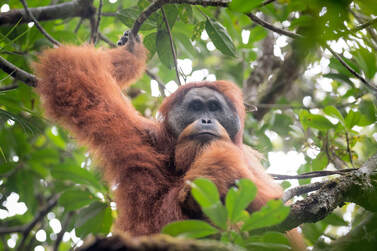 Photo permission granted by Sumatran Orangutan Society
Photo permission granted by Sumatran Orangutan Society
Tapanuli Orangutan Surveys in Batang Toru, Sumatra
Globally, fewer than 800 Tapanuli orangutans (Pongo tapanuliensis) remain in the wild, making them the most endangered great ape on the planet. Found only in the Batang Toru region of northern Sumatra, their future viability as a species depends on the successful protection of the rainforest habitat they rely on.
Through this project, Sumatran Orangutan Society (SOS) is working with local partners to engage forest-edge communities in Batang Toru to derive economic benefits from standing forests - empowering local people to protect their forest resources for the long term, resulting in a secure and enriched landscape for the Tapanuli orangutan population. The OSSP grant is supporting the initial groundwork phase of this important project by funding baseline surveys to record the current Tapanuli orangutan population numbers in key parts of the landscape, and wider distribution in the region - enabling conservation planning and the co-design of targeted action plans focused on protecting, connecting and rewilding the most strategically important areas of the Batang Toru landscape.
Globally, fewer than 800 Tapanuli orangutans (Pongo tapanuliensis) remain in the wild, making them the most endangered great ape on the planet. Found only in the Batang Toru region of northern Sumatra, their future viability as a species depends on the successful protection of the rainforest habitat they rely on.
Through this project, Sumatran Orangutan Society (SOS) is working with local partners to engage forest-edge communities in Batang Toru to derive economic benefits from standing forests - empowering local people to protect their forest resources for the long term, resulting in a secure and enriched landscape for the Tapanuli orangutan population. The OSSP grant is supporting the initial groundwork phase of this important project by funding baseline surveys to record the current Tapanuli orangutan population numbers in key parts of the landscape, and wider distribution in the region - enabling conservation planning and the co-design of targeted action plans focused on protecting, connecting and rewilding the most strategically important areas of the Batang Toru landscape.
2021 Grant Recipient for Basic Science
Validation of Radioimmunoassay Kits for Thyroxine and Free Thyroxin and Determination of Normal Reference Intervals for Thyroid Hormone Serum Concentrations in Orangutans (Pongo sp.)
 Photo Credit - Austin Barker
Photo Credit - Austin Barker
Melissa Fayette, DVM, DACZM (Indianapolis Zoo), Anneke Moresco, DVM, PhD (Reproductive Health Surveillance Program), Enass Bassiouny, MS (Michigan State University), Emily Vincent, DVM (Columbus Zoo), Dalen Agnew, DVM, DACVP, PhD (Michigan State University), and Brian Petroff, DVM, PhD (Michigan State University)
Thyroid disease has been observed in orangutans and other great apes in managed care. However, accurate diagnosis and treatment of these conditions is hindered by a paucity of published species-specific reference intervals for thyroid hormone serum concentrations. These values vary based on sex, age, and environmental and biological influences. Thyroid hormones play a critical role in the regulation of growth, metabolism, and reproduction. Excess or deficiency in thyroid hormones may contribute to the development of potentially life-threatening conditions such as hypertension, cardiovascular disease, and diabetes and may result in infertility. Thus, timely detection and treatment of thyroid dysfunction in orangutans is essential given its potential impact on the overall health and breeding success of this critically endangered species. Validation of commercially available radioimmunoassay kits for total thyroxine (T4) and free thyroxine (FT4) for use in orangutans was performed via serial dilution of banked serum samples (n=6) and inter-assay testing. This study aims to establish baseline reference intervals for T4, FT4, total triiodothyronine (T3), and thyroid stimulating hormone (TSH) in healthy orangutans.
Preliminary data analysis using samples from 71 orangutans shows that orangutans with three or more clinical signs consistent with hypothyroidism have significantly higher TSH levels compared to clinically normal orangutans but no significant differences were noted in T4, FT4, or T3 levels. In clinically normal orangutans, females have significantly higher T3 and T4 levels compared to males. Significant differences were also noted in TSH and T3 levels across age groups. However, some of the categories evaluated are data deficient which precludes forming strong conclusions at this time. Additional samples are needed to expand the study population and validation of a commercial radioimmunoassay kit for TSH is still in progress.
Thyroid disease has been observed in orangutans and other great apes in managed care. However, accurate diagnosis and treatment of these conditions is hindered by a paucity of published species-specific reference intervals for thyroid hormone serum concentrations. These values vary based on sex, age, and environmental and biological influences. Thyroid hormones play a critical role in the regulation of growth, metabolism, and reproduction. Excess or deficiency in thyroid hormones may contribute to the development of potentially life-threatening conditions such as hypertension, cardiovascular disease, and diabetes and may result in infertility. Thus, timely detection and treatment of thyroid dysfunction in orangutans is essential given its potential impact on the overall health and breeding success of this critically endangered species. Validation of commercially available radioimmunoassay kits for total thyroxine (T4) and free thyroxine (FT4) for use in orangutans was performed via serial dilution of banked serum samples (n=6) and inter-assay testing. This study aims to establish baseline reference intervals for T4, FT4, total triiodothyronine (T3), and thyroid stimulating hormone (TSH) in healthy orangutans.
Preliminary data analysis using samples from 71 orangutans shows that orangutans with three or more clinical signs consistent with hypothyroidism have significantly higher TSH levels compared to clinically normal orangutans but no significant differences were noted in T4, FT4, or T3 levels. In clinically normal orangutans, females have significantly higher T3 and T4 levels compared to males. Significant differences were also noted in TSH and T3 levels across age groups. However, some of the categories evaluated are data deficient which precludes forming strong conclusions at this time. Additional samples are needed to expand the study population and validation of a commercial radioimmunoassay kit for TSH is still in progress.
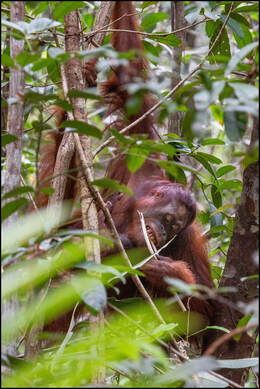 Orangutan Mawas eating the woody pith of a Dyera lowii tree while her one week old infant Mario clings to her side. Photo by Will Aguado
Orangutan Mawas eating the woody pith of a Dyera lowii tree while her one week old infant Mario clings to her side. Photo by Will Aguado
2020 Grant Recipient for Conservation - Useful Science
The Influence of Plant Secondary Metabolites on Diet Selection, Nutrition and Health of Wild Bornean Orangutans
William Aguado, PhD Student in Anthropology at Rutgers University
The objective of this study is to study how tannins, a common and widespread class of polyphenolic PSM, influence the diet and physiology of Bornean orangutans (Pongo pygmaeus wurmbii) in a peatland habitat in Central Kalimantan, Indonesia. Tannins are common feeding deterrents that are thought to reduce the digestibility of dietary protein thus influencing diet selection, nutrition, and consequently, health status of wild animals (Barbehenn and Constabel, 2011). Specifically, this research seeks to answer the questions of whether the activity of tannins (measured by the protein-binding capacity), in addition to nutrient content of plants, influence orangutan feeding decisions and food preference. Specifically, we aim to understand whether the influence of tannins is most pronounced during periods of nutritional stress, and if it varies over the course of development. This will be answered by pairing behavioral observations of orangutan feeding with chemical analyses of the nutrient composition and tannin activity in plant samples.
Our specific research questions are:
- Does the presence and activity of tannins influence the incorporation of plant foods into the orangutan diet and influence preference ranking of food items?
- Does tannin intake follow a “fallback food” model in which tannin intake is highest during the periods of preferred food scarcity? Do these periods of scarcity coincide with negative protein/energy balance?
- How does tannin and nutrient intake vary over the course of ontogeny?
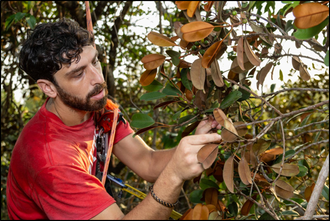 Will Aguado collecting fruits of Palaquium leiocarpum, a favored food item of orangutans from over 15m up in the canopy. Photo by Isa Betancourt.
Will Aguado collecting fruits of Palaquium leiocarpum, a favored food item of orangutans from over 15m up in the canopy. Photo by Isa Betancourt.
The data are for this project were collected at the Tuanan research center in the Mawas Reserve in Central Kalimantan, Indonesia. This site is a peat swamp forest with a high density of orangutans (van Schaik et al., 2005) and has been the focus of an intense 20-year study currently operating through an MOU between Universitas Nasional and Rutgers University. To answer the stated research questions above, wecollected behavioral data on orangutans of the Tuanan research site, plant samples for chemical analysis, data on fruiting, flowering, and flushing of trees in the Tuanan study site, and orangutan urine to analyze biomarkers of orangutan healt
2020 Grant Recipient for Conservation-Useful Science
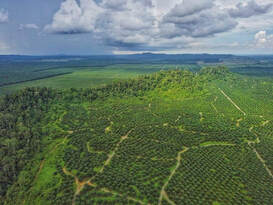 Photo Credit - Marc Ancrenez
Photo Credit - Marc Ancrenez
Gaining a New Understanding of Orangutans in Agricultural Mosaic Landscapes to Cause a Paradigm Shift in Conservation Strategy
The Orangutan SSP teamed up with the Orangutan SAFE Program, Seneca Park Zoo, Henry Vilas Zoo, Birmingham Zoo, HUTAN, Borneo Futures and Wildlife Impact to spearhead a potentially radical shift in orangutan conservation strategy. Translocation has been a frontline conservation tool to address human-orangutan conflict, but translocation is expensive and its success rate is not well understood. HUTAN has worked in the Kinabatangan region of Malaysian Borneo for decades, and, recently, has observed the persistence of orangutans, including females with young, in small forest patches (<1 hectare) surrounded by agriculture. Preliminary research suggests that these individuals are critical not only to long-term population viability but also to conservation of forest habitat.
The Orangutan SSP teamed up with the Orangutan SAFE Program, Seneca Park Zoo, Henry Vilas Zoo, Birmingham Zoo, HUTAN, Borneo Futures and Wildlife Impact to spearhead a potentially radical shift in orangutan conservation strategy. Translocation has been a frontline conservation tool to address human-orangutan conflict, but translocation is expensive and its success rate is not well understood. HUTAN has worked in the Kinabatangan region of Malaysian Borneo for decades, and, recently, has observed the persistence of orangutans, including females with young, in small forest patches (<1 hectare) surrounded by agriculture. Preliminary research suggests that these individuals are critical not only to long-term population viability but also to conservation of forest habitat.
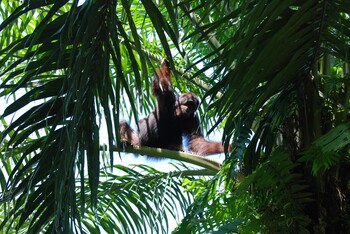 Photo Credit - Marc Ancrenez
Photo Credit - Marc Ancrenez
If these findings are broadly applicable across Borneo and Sumatra, translocation may actually be detrimental to long-term conservation efforts. In this project, we aim to understand orangutan ecology in forest fragments within palm oil landscapes and the effect of orangutan loss (through killing or translocation) through the collection and curation of new and existing data and the creation of novel population modelling. Next, utilizing the collective power of the Orangutan SSP, partner zoos, and conservation organizations, we will dissemination these findings to policy makers, industry stakeholders, and the general public to inform conservation action for orangutans with the overarching goal of causing a paradigm shift in orangutan conservation strategy to finally stop continued population decline and habitat loss.
2019 Grant Recipient for Emergency Appeal
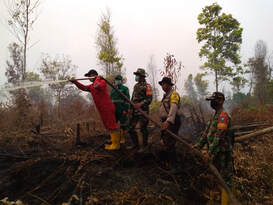 BNF's Community Firefighting Team working with local police and soldiers to stop the fires. Photo by MPA and Borneo Nature Foundation
BNF's Community Firefighting Team working with local police and soldiers to stop the fires. Photo by MPA and Borneo Nature Foundation
Borneo Nature Foundation
Borneo Nature Foundation (BNF) is a not-for-profit conservation and research organisation. They work to protect some of the most important areas of tropical rainforest and to safeguard the wildlife, environment and indigenous culture on Borneo.
Throughout their programmes, they support and empower community-led initiatives to protect forest and biodiversity, including anti-logging patrols, fire-fighting teams, environmental education and the replanting and restoration of damaged forests. All of their field programmes include high-quality scientific research as a basis for protecting and managing forests, and they have particular expertise in monitoring the distribution, population status, behaviour and ecology of Borneo’s flagship ape species; the endangered orangutan and southern Bornean gibbon. Their longest running programme, the Orangutan Tropical Peatland Project (OuTrop), was founded in 1999. They carry out long-term ecological research; contribute to peatland restoration efforts and support local initiatives to manage and protect peat-swamp forest habitat. We are proud to support, advise and fundraise for the TSA Kalteng Community Patrol Team and other fire-fighting units in Central Kalimantan, who put their lives on the line to stop fires and save the forest.
Peat fires have once again returned to Borneo and haze is engulfing the region. The Indonesian government has declared a state of emergency for the Central Kalimantan province and urgent help is needed to support the brave firefighters battling these quick-spreading fires.
Borneo Nature Foundation (BNF) is a not-for-profit conservation and research organisation. They work to protect some of the most important areas of tropical rainforest and to safeguard the wildlife, environment and indigenous culture on Borneo.
Throughout their programmes, they support and empower community-led initiatives to protect forest and biodiversity, including anti-logging patrols, fire-fighting teams, environmental education and the replanting and restoration of damaged forests. All of their field programmes include high-quality scientific research as a basis for protecting and managing forests, and they have particular expertise in monitoring the distribution, population status, behaviour and ecology of Borneo’s flagship ape species; the endangered orangutan and southern Bornean gibbon. Their longest running programme, the Orangutan Tropical Peatland Project (OuTrop), was founded in 1999. They carry out long-term ecological research; contribute to peatland restoration efforts and support local initiatives to manage and protect peat-swamp forest habitat. We are proud to support, advise and fundraise for the TSA Kalteng Community Patrol Team and other fire-fighting units in Central Kalimantan, who put their lives on the line to stop fires and save the forest.
Peat fires have once again returned to Borneo and haze is engulfing the region. The Indonesian government has declared a state of emergency for the Central Kalimantan province and urgent help is needed to support the brave firefighters battling these quick-spreading fires.
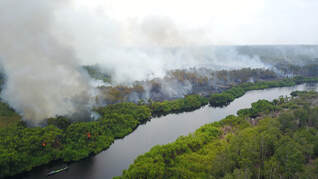 Forest fire on edge of Sebangau River. Photo by Markurius Sera and Borneo Nature Foundation
Forest fire on edge of Sebangau River. Photo by Markurius Sera and Borneo Nature Foundation
With drought conditions well underway fires are now spreading into primary rainforest and causing huge damage to the environment and wildlife.
Borneo Nature Foundation (BNF) is tackling these issues head-on.
Masyarakat Peduli Api (MPA), established and supported by BNF, are working tirelessly to extinguish the flames and prevent the spread of more fires. The brave men and women of the MPA are from villages bordering the Sebangau National Park, Central Kalimantan. These teams are truly on the frontline fighting to protect people, save the forest and stop the peat fires that are a major driver of global climate change.
BNF also supports the CIMTROP TSA fire-fighting team which has been active through five major fire events over the past 18 years; and are connecting all of these community teams through the Indonesian Disaster Agency.
Borneo Nature Foundation (BNF) is tackling these issues head-on.
Masyarakat Peduli Api (MPA), established and supported by BNF, are working tirelessly to extinguish the flames and prevent the spread of more fires. The brave men and women of the MPA are from villages bordering the Sebangau National Park, Central Kalimantan. These teams are truly on the frontline fighting to protect people, save the forest and stop the peat fires that are a major driver of global climate change.
BNF also supports the CIMTROP TSA fire-fighting team which has been active through five major fire events over the past 18 years; and are connecting all of these community teams through the Indonesian Disaster Agency.
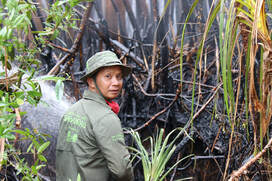 Hendri from CIMTROP Patrol Team and BNF Senior Project Coordinator 2019 Sebangau. Photo by Edwin Shri Bimo and Borneo Nature Foundation
Hendri from CIMTROP Patrol Team and BNF Senior Project Coordinator 2019 Sebangau. Photo by Edwin Shri Bimo and Borneo Nature Foundation
All these dedicated firefighters need your support. They need fuel, food and daily income for their families, so they are always ready to extinguish any fire that arises, and they need the latest technology, best equipment and proper safety gear so they can quickly locate, map and tackle the fires.
